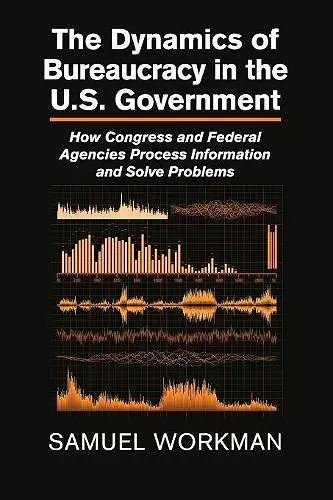The Dynamics of Bureaucracy in the US Government
How Congress and Federal Agencies Process Information and Solve Problems
Format:Paperback
Publisher:Cambridge University Press
Published:13th Jun '19
Currently unavailable, and unfortunately no date known when it will be back
This paperback is available in another edition too:
- Hardback£90.00(9781107061101)

This book assesses the influence of bureaucracy in American politics.
This book assesses the influence of bureaucracy in American politics, asking how government agencies and Congress come to know about, and understand, important policy problems confronting citizens and government officials.This book develops a new theoretical perspective on bureaucratic influence and congressional agenda setting based on limited attention and government information processing. Using a comprehensive new data set on regulatory policymaking across the entire federal bureaucracy, Samuel Workman develops the theory of the dual dynamics of congressional agenda setting and bureaucratic problem solving as a way to understand how the US government generates information about, and addresses, important policy problems. Key to the perspective is a communications framework for understanding the nature of information and signaling between the bureaucracy and Congress concerning the nature of policy problems. Workman finds that congressional influence is innate to the process of issue shuffling, issue bundling, and the fostering of bureaucratic competition. In turn, bureaucracy influences the congressional agenda through problem monitoring, problem definition, and providing information that serves as important feedback in the development of an agenda.
'Workman proposes an important and completely novel perspective on the relations between Congress and the bureaucracy. Based on a newly collected database of every federal regulation since the 1980s, he shows that Congressional committees and federal agencies are engaged in a mutual dance in which new information coming from agencies signals to Congress that developments require more attention or activity, and that the diversity or range in sources of the regulatory activity signal which parts of the issue require congressional intervention. The book is a model of methodology, theory building, and addressing an important issue of great substantive value: how does government set its agenda, and what is the role of the regulatory apparatus of the state in doing so? It will be seen as a major contribution to the literatures on agenda setting, bureaucratic politics, and congressional policy making for years to come.' Frank R. Baumgartner, University of North Carolina, Chapel Hill
'This is a book that forces us to think about the policy-making process in new ways. It puts bureaucracy at center stage. Rather than characterize the administrative state as the passive implementer of political decisions by elected officials, Workman argues that federal agencies are strategic actors competing for Congress's attention. Congress, in turn, is trying to learn from the administrative state and shape its information-providing activities. This is a book that utilizes amazing new data to illuminate how agencies influence the policy agenda and policy process as attention-seeking and attention-directing institutions.' David E. Lewis, Vanderbilt University, Tennessee
ISBN: 9781107679559
Dimensions: 228mm x 152mm x 18mm
Weight: 400g
207 pages